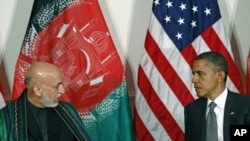A suicide bomber killed former Afghan President Burhanuddin Rabbani in Kabul on Tuesday. As head of Afghanistan's High Peace Council, Rabbani was tasked with leading efforts to find a political solution to the 10-year war with the Taliban. The significance of his death looms large for the future of the war in Afghanistan.
Rabbani began his career in 1971, when he became head of Jamiat-e-Islami. The Islamist party later formed one of the mujahedeen groups that fought Soviet forces following the Soviet Union's invasion of Afghanistan in 1979.
An ethnic Tajik, Rabbani became president of a shaky mujahedeen coalition government in 1992 after the collapse of the country's Soviet-backed communist government. The struggle for power among mujahedeen groups, split along mainly ethnic lines, sparked a civil war that resulted in the deaths of tens of thousands of people. Rabbani's presidency ended in 1996, with the rise of the Taliban, which was dominated by ethnic Pashtuns.
He then became the nominal head of the Northern Alliance, which joined with international forces in ousting the Taliban from power in 2001.
Rabbani regained political prominence almost a decade later, when he was named head of President Hamid Karzai's peace council in October of 2010.
Defense analyst Ikram Sehgal said that Rabbani was uniquely suited to lead the talks with the Taliban.
"The Taliban were willing to talk to him; they did not trust him fully because he was on the opposite side, but, at the same time, the fact of the matter remained that they took him up as an honest, upright person," said Sehgal. "And with that, you know, that loss is going to be very difficult to fill. There will be a vacuum there, which means people will have to go back and start the whole process over again."
There had been hopes that that the "surge" of NATO troops in Afghanistan would force the Taliban into negotiations. A strategy favored by top U.S. officials was to create conditions so militarily unfavorable that the Taliban would agree to cut a political deal with the Kabul government. A possible political settlement would thereby allow the transition of security responsibility from international troops to Afghan forces, which is set to be complete by the end of 2014.
For retired Pakistani colonel and security expert Khalid Munir, the death of Rabbani makes that outcome highly unlikely.
"This is very unlikely now. First off, the peace process will be delayed by months [or], if I am not wrong, by year, and America’s dream of moving out peacefully by 2014 will not materialize," said Munir.
Rabbani's death also is the latest in a long string of events indicating that the insurgency has changed its tactics from battlefield engagements to more spectacular bombings and assassinations.
In July, a suicide bomber killed President Karzai’s half-brother, Ahmed Wali Karzai, changing the dynamic in southern Afghanistan, where he was a power broker. That assassination called into question the security situation in Afghanistan, raising doubts about whether real progress was being made.
Rabbani’s killing is likely to raise similar doubts, both inside and outside Afghanistan, about the course of the war against the Taliban.
Killing of Afghan Ex-President Raises New Doubts About War
